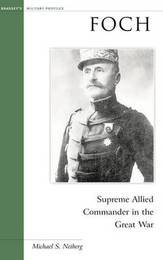
|
Foch: Supreme Allied Commander in the Great War
Paperback
Main Details
| Title |
Foch: Supreme Allied Commander in the Great War
|
| Authors and Contributors |
By (author) Michael S. Neiberg
|
| Series | Military Profiles |
|---|
| Physical Properties |
| Format:Paperback | | Pages:128 | | Dimensions(mm): Height 204,Width 126 |
|
| Category/Genre | First world war |
|---|
| ISBN/Barcode |
9781574886726
|
| Classifications | Dewey:940.40092 |
|---|
| Audience | | General | | Tertiary Education (US: College) | |
|---|
|
Publishing Details |
| Publisher |
Potomac Books Inc
|
| Imprint |
Potomac Books Inc
|
| Publication Date |
31 October 2003 |
| Publication Country |
United States
|
Description
Ferdinand Foch is the prototype of the twentieth-century general. Better than any other general of the First World War, Foch came to understand how technology and modern alliance systems had changed the nature of warfare. He is most famous for his role as Allied commander in chief in 1918. In this position, unparalleled in the history of warfare, Foch welded together the disparate war efforts of France, Great Britain, the United States, Italy, and Belgium. Now fighting as a more coherent whole, the Allies repulsed the German spring offensives of 1918 and returned to the attack themselves in the summer. In this role, Foch foreshadowed the similar roles played by other commanders of large coalitions, such as Dwight Eisenhower in World War II and Norman Schwarzkopf in Desert Storm. Foch's other important legacy is his public dispute with French prime minister Georges Clemenceau during the armistice and peace negotiations. Foch argued strongly for the creation of Allied bridgeheads across the Rhine River to ensure that a less populous and less industrialized France could defeat a vengeful Germany in the future if necessary. His public quarrels with Clemenceau, who did not share Foch's opinion and did not care for his interference, left the French Third Republic with a civil-military crisis as menacing as the one with which it began World War I. Foch's legacies are both positive and negative, but he left a profound impact on the twentieth century. Michael S. Neiberg masterfully analyzes this complex man and provides a solid overview of French political history against the fabric of the twentieth century's first industrialized war.
Author Biography
Michael S. Neilberg is Professor of History and co-director of the Center for the Study of War and Society at the University of Southern Mississippi. He is the author or editor of more than a dozen books, including his first book, Making Citizen-Soldiers: ROTC and the Ideology of American Military Service , published by Harvard University Press in 2000. He taught on the faculty of the United States Air Force Academy for eight years and focuses his work on the international dimensions of the First World War and warfare more generally. Among his most recent books are Fighting the Great War: A Global History (Harvard University Press) and a forthcoming study of the Second Battle of the Marne, to be published by Indiana University Press for its Twentieth Century Battles series.
Reviews"A tightly but elegantly crafted biography." --WESTERN FRONT ASSOCIATION "A tightly but elegantly crafted biography." "Because of the central role Foch played in the war's final campaigns, Michael Neiberg's concise biography is a welcome addition to military history."
|